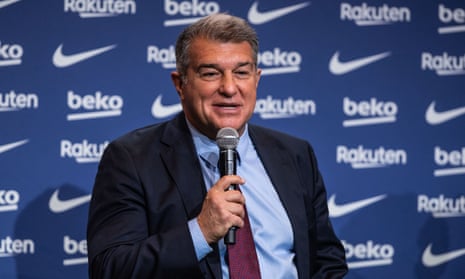State-owned clubs are causing “instability” in football and should be subject to stricter rules, Joan Laporta, the president of Barcelona, has said.
Laporta revealed he was lobbying Uefa to at least harmonise rules over club ownership across Europe because state-owned clubs, such as Manchester City and Paris Saint-Germain, are “not using the same tools” to compete.
“The state clubs are a problem because they provoke an instability of our sport, of football in Europe,” he said. “I’m asking for rules that have to be more strict for these kinds of clubs because the resources they are using in football doesn’t come from the football industry.
“In our case, and most of the clubs in Europe, the resources that we are generating come from the industry of sports … and these state clubs are not using the same tools in order to compete. It is complicated to compete with these clubs that have a lot of big players spread around the world. And when you go to the market to buy players, it’s difficult to compete.
“I ask the regulators like Uefa and leagues of each country to be stricter, or at least harmonise all the rules. Because, for instance, in Spain we have rules much more strict than in France or the Premier League.”
Laporta was speaking at the launch of a new partnership between Barcelona and UNHCR, the UN refugee agency. Under the agreement, the UNHCR logo will appear on the shirts of the Barcelona men’s and women’s teams for the next four seasons. The club will also work with the agency on funding football projects for refugees in Colombia, Uganda, Turkey and Malaysia.
Spanish financial controls are structured in such a way that clubs must lay out their spending in advance, with controls set by authorities at La Liga. There are two clubs in Spain with connections to state investment – Girona, part-owned by Manchester City’s parent company, City Football Group, and Almería, owned by Turki Al-Sheikh, an adviser to the Saudi royal family. Almería won promotion to La Liga this season but have been sanctioned by Spanish authorities for inflating the value of sponsorship deals with Saudi brands.
Barcelona need to plug a €500m gap in their finances. Laporta said he believed the club would be able to “revert” its finances in one year, adding he would address Barça’s members over plans to “implement economic options we have”.
He also addressed the topic of the Super League, with Barcelona one of three clubs, alongside Real Madrid and Juventus, still backing the plan and set to receive a ruling from the European court of justice in July on whether or not Uefa can prevent the breakaway.
“I would say that the groups that are promoting the Super League continue their course,” Laporta said. “This is a long process, we are not in an excessive hurry.”
